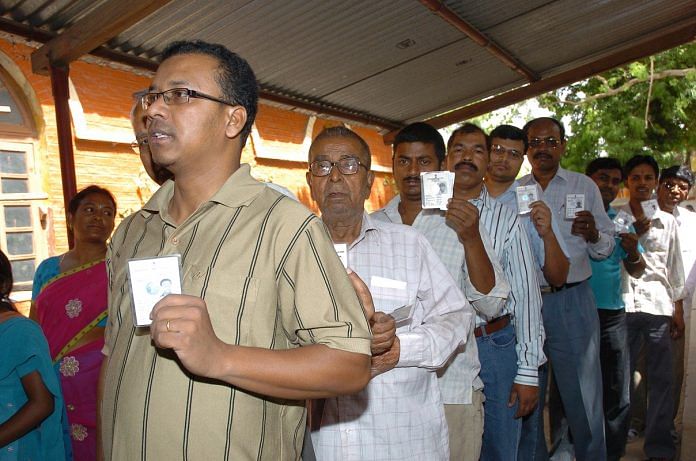ADR, in its submissions to the law panel, also dismisses the argument that repeated enforcement of the model code interferes with governance.
New Delhi: Holding simultaneous elections will amount to imposing a presidential form of government in the country with “mala fide intention”, the Association for Democratic Reforms (ADR), an NGO working in the area of electoral and political reforms, has told the Law Commission.
In its submissions made to the commission earlier this week, the ADR, in collaboration with The Hindu Centre for Public Policy, said simultaneous polls will mean “striking at the root of Parliamentary democracy” since the move has Prime Minister Narendra Modi’s “imprint all over it”.
A striking fact about the talk around simultaneous elections is “the relentless, almost feverish, campaign by the government and the ruling party”, Jagdeep S. Chhokar, a founding member of ADR, said in the submissions.
A senior official in the commission said an allegation of mala fide intention cannot stand against the Parliament, which will ultimately bring an amendment in the Constitution to effect simultaneous elections, but the commission will consider the submissions made by ADR.
“So far, nobody else has challenged the idea on this basis, so we will consider it,” the official said.
In its written submissions, the ADR also stated that Parliament does not have the power to amend the basic structure of the Constitution, which such a move will invariably entail.
The law panel will examine this assertion since a law can be challenged on the basis of the competence of the body enacting it, the senior official, who did not want to be quoted, said.
Model code of conduct
The ADR also dismissed the oft-made argument that the repeated enforcement of the model code of conduct (MCC) is an interference in governance.
“The MCC does NOT ask for existing programmes to be put on hold at all. Normal governance obviously has to go on and it does go on,” Chhokar said in the submissions given to the commission.
Governance suffers not because of the MCC but the fact that “the smallest of election anywhere in the country is treated as if it is a referendum on the government, and almost all ministers spend their work time campaigning or doing other things related to the election.”
The brief also states that the submissions made by the NITI Aayog in 2017 in this regard are “gross exaggerations”.
The NITI Aayog Discussion Paper, which came out in April last year, had stated, “Effectively, except the routine administrative activities, other development programmes, welfare schemes, capital projects etc. remain largely suspended till the time the model code is applicable and in the area it is in operation.”
The arguments made in the paper, the submissions further said, are “at variance with the prohibitions listed in the MCC, which are applicable only to introduction of new programmes, and particularly those that seem to have a direct bearing on the results of the impending election.”
“It is a different matter that political parties in power seem to wake up from their slumber only a couple of months before the next election is due,” it said.
Election expenditure
Further, the Niti Aayog paper falsely created the impression that the massive expenditure on elections – which has consistently been increasing – is incurred by the government, the submissions said.
“By far the greatest expenditure during elections is incurred by political parties followed by candidates,” it added.
Given that political parties themselves are reluctant to disclose the sources of their funds and the expenditure incurred, their desire to cut down expenditure remains suspect. “The faith NITI Aayog shows in the seeming desire of political parties to solve systemic problems adversely affecting the polity is touching but it is not borne out by the experience of at least the last two decades,” said the ADR submissions.
Finally, even if the expenditure can be reduced through synchronising polls across the country, “Is it possible, or is it even desirable or advisable, to assign a monetary value or cost to democracy?” it asked. “Should the nation be looking to create the ‘most effective’ democracy or the ‘least expensive’ democracy?”



